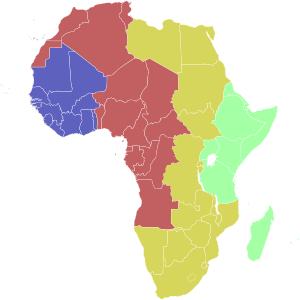As of 2018[update], daylight saving time (DST) is permanently observed in Morocco. Previously, time was advanced to UTC+01:00 at 02:00 on the last Sunday of March, and reverted to UTC+00:00 (standard time), defined as Greenwich Mean Time locally, at 03:00 on the last Sunday of October. This practice was continued until October 2018, after which clocks were permanently advanced. An exception was made during the month of Ramadan during which clocks reverted to UTC+00:00 (standard time).[1][2]

| Light Blue | Cape Verde Time[a] (UTC−1) |
| Blue | Greenwich Mean Time (UTC) |
| Red | (UTC+1) |
| Ochre | (UTC+2) |
| Green | East Africa Time (UTC+3) |
| Turquoise | (UTC+4) |
b Mauritius and the Seychelles are to the east and north-east of Madagascar respectively.
For 2014, these dates were:
History
edit
- 2008: DST began on 1 June and ended on 1 September. This was the first time Morocco had used daylight saving time since 1978.[4]
- 2009: DST began on 1 June and ended on 21 August.[5]
- 2010: DST began on 2 May and ended on 8 August, just before Ramadan, as had been the case in recent years.[6]
- 2011: DST began on 2 April at midnight and ended on 31 July at midnight.[7]
- 2012: On 8 March 2012, the Moroccan Cabinet approved a bill for the permanent adoption of DST with predictable start and finish dates. However, before the start of DST, they changed it to advance to UTC+01:00 at 02:00 on the last Sunday of April, and return to UTC at 03:00 on the last Sunday of September, with the exception of the holy month of Ramadan, during which DST will not be observed.[8][9] As a result, the time changes in 2012 were:
- 2013: DST followed the 2012 law at first:
- 28 April – advance to UTC+01:00 (DST)
- 7 July – return to UTC+00:00 (start of Ramadan)
- 10 August – advance to UTC+01:00 (end of Ramadan)
- 28 September – The government announced a change in policy, which moved the end of DST from the last Sunday in September (which was to be the next day) to the last Sunday in October (27 October). At the same time, they moved the beginning of DST back to the last Sunday in March (next 30 March 2014). As usual, advancements to DST (UTC+01:00) occurred at 02:00 and returns to standard time (UTC+00:00) occurred at 03:00.[1]
- 2018: Switch to permanent DST:[11] On 26 October in a government decree, the government changed UTC offset for Morocco Time Zone, Morocco Time Zone now use UTC+01:00 all year round except during Ramadan. However, this decree mandates permanent daylight saving time.
References
edit- ^ a b "Morocco extends DST to October 27, 2013". timeanddate.com. 28 September 2013. Retrieved 1 October 2013.
- ^ "L'horaire d'été (GMT+1) maintenu jusqu'au 27 octobre 2013" (in French). Royaume de Maroc. 28 September 2013. Retrieved October 1, 2013.
- ^ a b "Retour à l'heure légale du Royaume (GMT)" (in French). Moroccan Ministry of the Modernisation of the Public Sector. Archived from the original on 2014-10-26. Retrieved 2014-10-26.
- ^ "Morocco revives daylight saving schedule in 2008". Timeanddate.com. Retrieved 2010-06-25.
- ^ "Morocco's Daylight Saving Time Starts June 1, 2009". Timeanddate.com. 17 March 2009. Retrieved 2010-06-25.
- ^ "Morocco Starts Daylight Saving Time May 2, 2010". Timeanddate.com. 13 April 2010. Retrieved 2010-06-25.
- ^ "L'heure légale au Maroc sera avancée de 60 mn à partir de dimanche prochain". Map.ma. Retrieved 2011-03-31.[dead link]
- ^ "Retour à l'heure légale du Royaume (GMT)" (in French). The Kingdom of Morocco, Ministry of Public Functions and Administration Modernisation. p. 1. Archived from the original on 2013-05-12. Retrieved 2012-07-17.
- ^ http://www.maroc.ma/PortailInst/Fr/evenements/Le+Conseil+de+gouvernement.htm[permanent dead link]
- ^ "Changement de l'heure légale du Royaume" (in French). The Kingdom of Morocco, Ministry of Public Functions and Administration Modernisation. 2012-04-19. Archived from the original on 2012-11-21. Retrieved 2012-07-17.
- ^ "الاستمرار في العمل بالساعة الإضافية : (GMT + 1)" (in Arabic). وزارة الوظيفة العمومية وتحديث الإدارة. 2018-10-26. Archived from the original on 2018-10-29. Retrieved 2018-10-26.